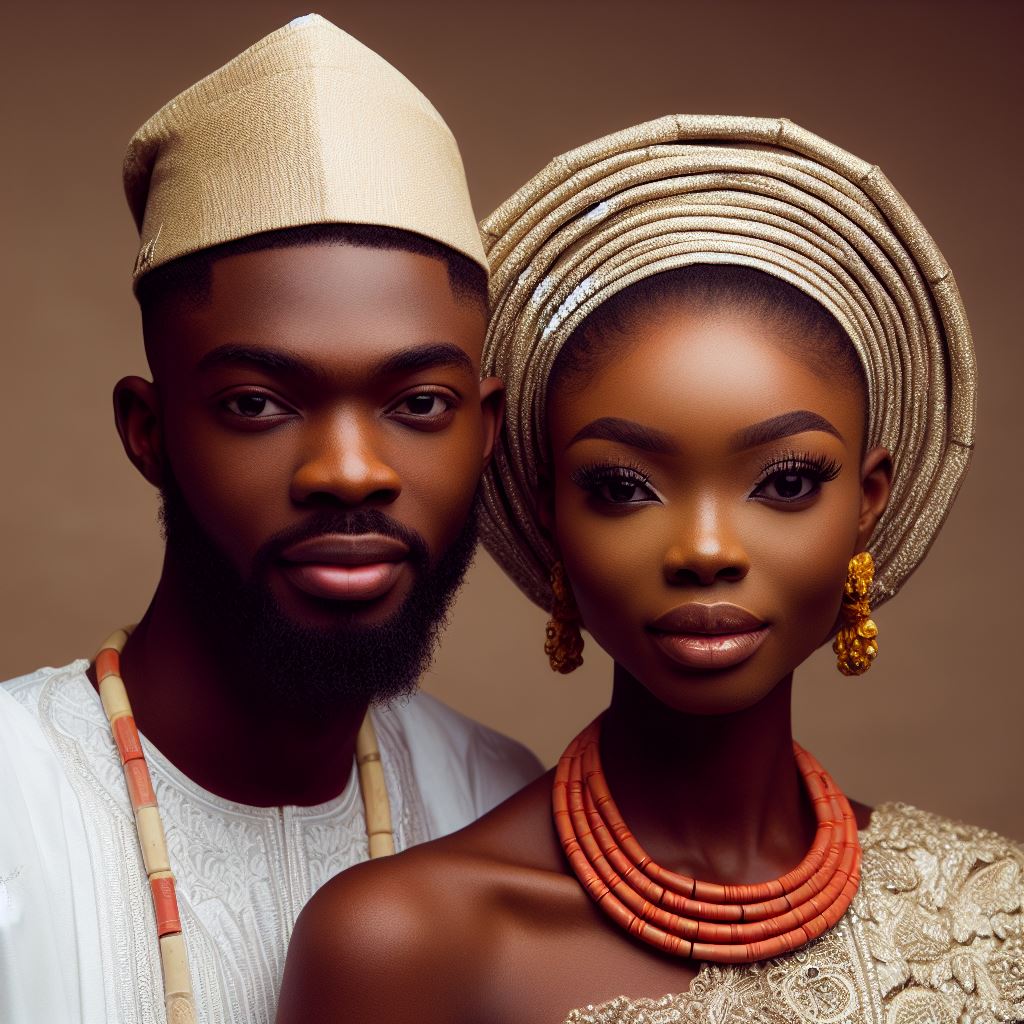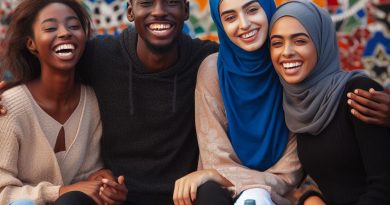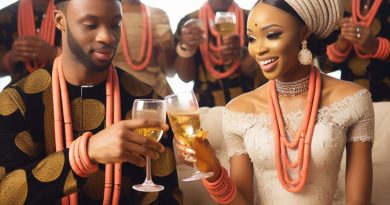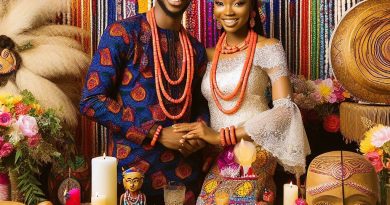Celebrations and Rituals: The Joy of Nigerian Weddings
Last Updated on October 22, 2023
Introduction
Let’s explore celebrations and rituals: The joy of Nigerian weddings.
Nigerian weddings are rich in celebrations and rituals, which hold great significance in their culture.
These traditions are integral to the joyous occasion, bringing families and communities together in unity and love.
Celebrations and rituals are an essential part of Nigerian weddings, reflecting the country’s diverse cultural heritage.
They serve as a way to honor ancestors, seek blessings, and unite the bride and groom’s families.
Nigerian weddings are known for their grandeur and vibrant festivities.
From the traditional engagement ceremony to the church wedding and the lavish reception, every step is marked with joyous celebrations and meaningful rituals.
These celebrations and rituals play a crucial role in Nigerian weddings.
They strengthen family bonds, promote cultural identity, and provide a platform to showcase traditional customs and values.
One of the most significant rituals is the dowry ceremony, where the groom’s family presents gifts and payments to the bride’s family.
This act symbolizes respect, commitment, and the joining of two families.
Another important celebration is the traditional attire and accessories worn by the bride and groom.
These outfits represent the richness of Nigerian culture and heritage, reflecting the uniqueness of each ethnic group.
Dancing and music are also integral to Nigerian weddings.
Traditional songs and dances are performed, creating an atmosphere of pure joy and excitement.
It brings together young and old, creating cherished memories that will be passed down through generations.
In short, Nigerian weddings are a celebration of love, traditions, and cultural heritage.
The importance of celebrations and rituals cannot be overstated, as they bring people closer, honor ancestors, and create an atmosphere of joy and unity.
They serve as a reminder of the richness and beauty of Nigerian culture.
Pre-Wedding Rituals
The pre-wedding phase in Nigerian culture is a joyful time filled with various rituals and celebrations.
These rituals serve as a way to honor tradition, strengthen familial bonds, and prepare the couple for their journey into marriage.
Traditional engagement ceremony
One of the most important pre-wedding rituals is the traditional engagement ceremony.
This event is a grand affair and marks the official announcement of the couple’s intention to marry.
It is typically a colorful event filled with music, dance, and elaborate traditional attire.
Bride price negotiation
During the traditional engagement ceremony, the bride price negotiation takes place.
This is a significant part of Nigerian weddings, where the groom’s family presents gifts or payment to the bride’s family as a way of showing respect and appreciation.
The negotiation process can be lively and filled with good-natured banter between the families involved.
Introduction of families
Another crucial pre-wedding ritual is the introduction of families.
This is an opportunity for both families to come together, meet, and bond before the wedding.
It allows them to get to know each other better, exchange pleasantries, and establish a common ground.
Bridal shower
As the wedding day approaches, the bride is usually celebrated with a bridal shower.
This is an exclusive event organized by the bride’s friends and female family members.
It is a time of joy, laughter, and love, where the bride receives gifts, advice, and emotional support as she prepares for the next chapter of her life.
Bachelor’s party
Similarly, the groom also gets his moment of celebration with the bachelor’s party.
This event is typically organized by the groom’s friends and male family members.
It is a night of fun, camaraderie, and bonding before the groom transitions into married life.
These pre-wedding rituals play significant roles in Nigerian weddings.
They bring together families, involve the couple’s closest friends, and create a sense of excitement and anticipation for the upcoming nuptials.
They serve as a way to honor tradition, celebrate love, and ensure a smooth transition into married life.
In short, pre-wedding rituals in Nigerian culture are filled with joy and celebration.
From the traditional engagement ceremony to bride price negotiations, introduction of families, bridal showers, and bachelor’s parties, each ritual holds special meaning and significance in preparing the couple for their wedding day.
These rituals showcase the beauty and richness of Nigerian traditions and strengthen the bonds between families and friends.
Wedding Ceremony
In Nigerian weddings, one of the most important aspects of the celebration is the wedding ceremony itself.
It is during this time that the couple comes together before their loved ones and officially becomes husband and wife.
Venue selection
Choosing the perfect venue for the wedding ceremony is of utmost importance.
Nigerian couples often spend a considerable amount of time and effort in selecting a location that suits their preferences and accommodates their guests.
Whether it is a grand banquet hall, a breathtaking garden, or a religious place of worship, the venue sets the tone for the entire event.
Traditional attire
A significant element of Nigerian weddings is the traditional attire.
Both the bride and groom dress in culturally rich garments, representing their heritage and adding a touch of elegance and grandeur to the ceremony.
The outfits are often colorful, embellished with intricate embroidery and beadwork, making the couple look resplendent on their special day.
Importance of colors
Colors play a vital role in Nigerian wedding ceremonies. Each color holds symbolic meaning, representing various aspects of life.
Red symbolizes love and fertility, gold represents wealth and prosperity, while white signifies purity and spiritual significance.
The chosen color scheme not only sets the mood but also adds a visual spectacle for all attendees.
Arrival of the bride
Upon the arrival of the bride, she is welcomed with great fanfare.
Accompanied by her family and friends, she makes a grand entrance, often walking on a crimson carpet and preceded by traditional music and dance performances.
The arrival of the bride is a moment of excitement and anticipation for the guests.
Religious ceremony (if applicable)
In weddings with religious affiliations, a religious ceremony may take place.
This ceremony reflects the couple’s faith and incorporates traditional rituals and blessings.
Whether it is a Christian, Muslim, or traditional African wedding, the religious ceremony holds deep meaning for the couple and their families.
Exchange of vows
During the ceremony, the couple exchanges heartfelt vows, expressing their love, loyalty, and commitment to each other.
These vows serve as a public declaration of their intent to spend the rest of their lives together, through joys and challenges.
Pronouncement of marriage
Finally, the pronouncement of marriage is made by the officiant, cementing the union of the couple.
This declaration marks the completion of the wedding ceremony and the beginning of their journey as a married couple.
Cheers and applause fill the air as family and friends celebrate the newlyweds.
The wedding ceremony is undoubtedly the highlight of Nigerian weddings.
It is a time to celebrate love, tradition, and the joining of two families.
With careful selection of the venue, traditional attire, and the meaningful exchange of vows, Nigerian couples create a ceremony that binds them closer and creates beautiful memories to cherish for a lifetime.
Read: Marriage Counselling: Why it Matters in Nigerian Context
Celebration and Festivities
When it comes to Nigerian weddings, celebrations and festivities are an integral part of the joyous occasion.
From music and dancing to traditional food and drinks, every element adds to the overall sense of merriment.
Music and dancing
Nigerian weddings are known for their energetic music and lively dancing.
The beats of Afrobeat, highlife, and other genres fill the air, creating an electrifying atmosphere that gets everyone on their feet.
Traditional music and instruments
To add a touch of cultural authenticity, traditional Nigerian music and instruments are often incorporated into the wedding celebrations.
From the captivating sounds of the talking drum to the enchanting melodies of the flute, these instruments bring a unique charm to the event.
Cultural dances
Various cultural dances take center stage during Nigerian weddings.
Whether it’s the energetic and acrobatic dance moves of the Ekombi or the graceful steps of the Yoruba Bata dance, these performances showcase the rich diversity of Nigerian culture.
Live band or DJ
Wedding receptions often feature either a live band or a DJ to keep the festivities going.
The live band brings a vibrant and dynamic live music experience, while a DJ mixes popular Afrobeat and contemporary tunes, ensuring that everyone has a great time on the dance floor.
Traditional food and drinks
A Nigerian wedding feast is a true culinary delight.
Traditional dishes such as jollof rice, pounded yam, egusi soup, and suya tantalize the taste buds of the guests.
Refreshing drinks like palm wine and zobo (hibiscus) are served to complement the flavors.
Showering the couple with money
In Nigerian weddings, it is customary for guests to spray the newlywed couple with money as a symbol of love, well-wishes, and financial blessings.
This joyful act is usually accompanied by ululations, cheers, and applause, creating a festive atmosphere.
In essence, Nigerian weddings are brimming with celebration and festivities.
From the lively music and dancing to the presence of traditional food, drinks, and cultural performances, these weddings embody the essence of joy and togetherness.
So, next time you attend a Nigerian wedding, be ready to dance, indulge in delicious food, and shower the couple with blessings in the form of money!
Read: Financial Aspects of Marriage: A Nigerian Perspective

Traditional Customs and Rituals
Nigerian weddings are steeped in rich traditions and customs that add an extra layer of beauty to the joyous occasion.
These customs reflect the cultural heritage and values of the Nigerian people, fostering a sense of unity and celebration that is unique to this vibrant country.
Breaking of kola nuts
One of the most symbolic rituals observed in Nigerian weddings is the breaking of kola nuts.
Kola nuts hold great significance in Nigerian culture as a symbol of hospitality and unity.
During the wedding ceremony, the couple breaks the kola nuts and shares them with their families and guests, symbolizing their willingness to extend friendship and welcome all those present.
Pouring of libation
Another customary ritual that takes place during Nigerian weddings is the pouring of libation.
This ritual involves an elder or a chosen family member pouring a small amount of palm wine or water onto the ground while reciting prayers.
The pouring of libation is a way to honor and seek the blessings of the departed ancestors, acknowledging their presence and seeking their guidance and protection for the couple’s journey together.
Tying of the knot
The tying of the knot is yet another customary practice that holds profound meaning in Nigerian weddings.
During the ceremony, the couple’s hands are joined together with a piece of cloth, usually a traditional fabric called aso oke, which symbolizes their unity and commitment to each other.
This act signifies the binding of their lives together and their promise to support and uplift one another in their marriage.
Exchange of gifts
Exchanging gifts is an integral part of Nigerian wedding customs.
Both families exchange presents as a gesture of goodwill and appreciation.
These gifts can include traditional items such as clothes, jewelry, and household utensils.
The exchange of gifts serves as a token of gratitude and demonstrates the families’ support and acceptance of the couple’s union.
Blessings from elders
Seeking blessings from elders is an imperative part of Nigerian weddings.
The couple visits their elders, such as parents, grandparents, and respected community members, to seek their blessings for a successful and prosperous marriage.
The elders offer prayers, words of wisdom, and blessings, imparting their wisdom and experience onto the couple as they embark on their marital journey.
In general, Nigerian weddings are enriched with traditional customs and rituals that showcase the country’s cultural heritage and values.
The breaking of kola nuts, pouring of libation, tying of the knot, exchange of gifts, and blessings from elders play an integral role in these joyous celebrations.
These customs foster unity, symbolize commitment, honor ancestors, and seek blessings for a blissful and prosperous future for the newly married couple.
Embracing these traditions not only links the present to the past but also reinforces the importance of culture and family in Nigerian society.
Read: Marriage and Religion: The Interplay in Nigerian Society
Importance of Family and Community
In Nigerian weddings, the involvement of the extended family is of utmost importance.
The support and blessings from relatives and friends contribute to the joy of the celebration.
Celebrating a wedding serves as a symbol of unity and love among family and friends.
Not only does it bring joy to the couple, but it also strengthens the bond within the community.
Extended family involvement
The participation of the extended family is a significant aspect of Nigerian weddings.
Relatives from both sides actively contribute to the planning and execution of the wedding.
Uncles, aunts, cousins, and other family members play various roles in making the event memorable.
Support and blessings from relatives and friends
Nigerian weddings are known for the overwhelming support and blessings bestowed upon the couple.
Relatives and friends come together to offer their well wishes for a prosperous and happy marriage.
These blessings are believed to bring good luck and ensure a successful union.
Celebration as a symbol of unity and love
Weddings in Nigeria are not just about two individuals getting married; they are about joining families.
The celebration serves as a symbol of unity and love between the two families coming together.
It represents the merging of traditions, customs, and beliefs, creating a new bond.
Strengthening the bond within the community
When a wedding takes place, it is not only a celebration for the couple but also for the entire community.
The event brings people together, fostering a sense of belonging and togetherness.
It strengthens the bond within the community and reinforces the importance of shared values.
In brief, the importance of family and community in Nigerian weddings cannot be overstated.
The involvement of the extended family, the support and blessings from relatives and friends, and the celebration as a symbol of unity and love all contribute to the joyous atmosphere.
Furthermore, these weddings serve as a means to strengthen the bond within the community and remind everyone of the significance of togetherness and shared values.
Nigerian weddings truly embody the joy and happiness that come from celebrating love and family.
Read: The Role of Extended Family in Nigerian Marital Life
Modern Trends and Innovations
Modern Nigerian weddings have embraced various trends and innovations that add a touch of uniqueness and excitement to the celebrations.
These trends reflect the influence of Western ideas and customs, as well as the growing presence of social media and technology.
Incorporation of Western ideas and customs
Nigerian weddings have begun incorporating Western traditions like exchanging wedding vows.
The influence of Western wedding culture can be seen in the preference for white wedding gowns.
Many couples now opt for a combination of traditional Nigerian attire and Western-style outfits.
Receptions often include elements like cutting a wedding cake and a first dance.
The incorporation of Western ideas brings a modern and international flavor to Nigerian weddings.
Destination weddings
Destination weddings have become increasingly popular among Nigerian couples.
Exotic locations such as Dubai, Paris, and the Caribbean are now favored for weddings.
Couples choose destination weddings for the unique experience and stunning backdrops.
Destination weddings also allow the couple to combine their wedding and honeymoon in one memorable event.
This trend showcases the adventurous spirit of Nigerian couples and their desire for exceptional celebrations.
Customized wedding hashtags and social media sharing
With the rise of social media, Nigerian weddings now have customized wedding hashtags.
Couples encourage guests to use the hashtags when posting pictures and videos on social media.
It allows all the wedding moments to be easily searchable and creates a sense of digital community.
Friends and family who couldn’t attend can still feel connected by following the online updates.
Customized wedding hashtags and social media sharing have become a integral part of modern Nigerian weddings.
Pre-wedding photoshoots
Pre-wedding photoshoots have become a popular trend among Nigerian couples.
Couples hire professional photographers to capture their love story in a creative and artistic way.
These photos are often displayed at the wedding reception and shared on social media.
Pre-wedding photoshoots allow couples to express their personalities and showcase their love.
This trend adds another level of romance and excitement to Nigerian weddings.
Professional wedding planners
More Nigerian couples are now hiring professional wedding planners to handle the intricate details of their weddings.
Wedding planners bring expertise, creativity, and industry connections to create unforgettable events.
They ensure smooth execution, manage budgets, and offer innovative ideas to make the wedding unique.
Professional wedding planners alleviate stress for the couple and ensure a flawless celebration.
This trend has elevated the standard of Nigerian weddings and transformed them into grand productions.
In summary, modern Nigerian weddings have embraced various trends and innovations that add excitement and uniqueness to the celebrations.
Incorporating Western ideas and customs, destination weddings, customized wedding hashtags, pre-wedding photoshoots, and the involvement of professional wedding planners have all contributed to the evolution of Nigerian weddings into grand and unforgettable events.
These trends reflect the changing preferences of Nigerian couples and the influence of global wedding culture.
Nigerian weddings continue to be a joyous celebration of love and the merging of traditions.
Conclusion
Nigerian weddings are rich in celebrations and rituals that hold great importance in their culture.
Throughout this blog section, we have explored various aspects of these traditions and the joy they bring.
The beauty of Nigerian weddings lies in the unity, love, and happiness that radiate from every ceremony and gathering.
From the elaborate attire to the vibrant music and dances, these celebrations create an atmosphere filled with joy.
It is evident that these rituals play a significant role in fostering a sense of community and family bonds.
If you have ever attended a Nigerian wedding, we would love to hear about your personal experiences and thoughts.
Feel free to share your stories in the comments section below and let us continue the conversation on this beautiful cultural celebration.
Celebrations and rituals in Nigerian weddings not only unite couples in marriage but also bring together communities in joy and harmony.
Let us cherish and appreciate the traditions that make Nigerian weddings truly special and unforgettable.
Thank you for joining us on this journey through the joy of Nigerian weddings!


